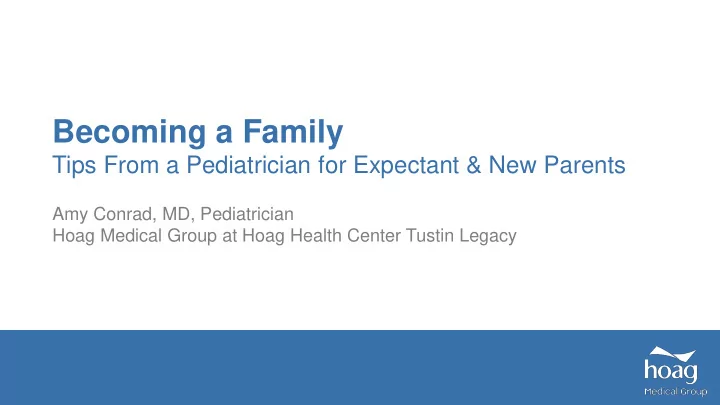

Becoming a Family Tips From a Pediatrician for Expectant & New Parents Amy Conrad, MD, Pediatrician Hoag Medical Group at Hoag Health Center Tustin Legacy
In the Hospital Vit K injection, antibiotic eye ointment, Hep B vaccine Hearing test Test for critical congenital heart disease-check oxygen in arms and legs Newborn screening
• Benefits: decreased risk urinary tract infections, STIs, cancer of the penis • Risks: bleeding, infection, damage to penis, unsatisfactory cosmetic result (too little or too much foreskin removed). Serious risk rate 0.2% Circumcision • AAP “Health benefits outweigh the risk, and the benefits of newborn male circumcision justify access to this procedure for those families who choose it” • Rate varies also with religion, socioeconomic status, race, ethnicity and geography • Technique: physician’s choice • US rate 2000-2008: 56%
Feeding • Breast feeding 8-12 times per day and often takes up to a week to get well established • 10% of weight loss in the first few days of life. Back to birth weight in 2 weeks • Most babies are below birth weight at 7 days of life • Colostrum is GOLD (low volume, amazing value) • Resources: lactation consult before discharge, in-person lactation consult after birth at Hoag, in- home lactation consult (private), Pacify App
Sleep • Average is 16- 18 hours of sleep per day • Babies don’t know day from night, initially (usually by 2 months of age) • By 3 months, most babies can sleep 6-8 hours without waking
Best Sleeping Practices • Sleep on their back • Sleep in their own space (e.g. crib, bassinet) on a firm mattress • No bedding, pillows, stuffed animals, bumper pads in bed • Babies should not sleep on couches, cushioned chairs or on parent’s bed, even in a DockATot • Avoid overheating • Immunizations • Breastfeeding • Room sharing until 6 months of age • Offer pacifier at nap and bedtime • Avoidance of smoking, alcohol use, illicit drug use around baby • “Do not use home cardiorespiratory monitors as a strategy to reduce SIDS”
Daily Crying Minutes vs. Age of Child 160 140 120 100 80 60 40 20 0 1-2 weeks 3-4 weeks 5-6 weeks 8-9 weeks 10-12 weeks
Crying
Vaccines • Yes, they are safe and important • They do not overwhelm immune system. Immunogenic protein and polysaccharides in normal childhood vaccine schedule 1960 3217 1980 3041 2000 123-126 • Babies are not too young for vaccines. Their immature immune system makes them more vulnerable to infection, thus, the need for vaccines • Resources: California Immunization Coalition, CDC • www.immunize.org/concerns • www.vaccinateyourbaby.org • https://www.chop.edu/centers-programs/vaccine-education-center/resources/vaccine-and-vaccine- safety-related-qa-sheets
Can I take the baby outside????
Taking a Baby Home during a Pandemic • Normal feelings of isolation and anxiety are intensified • Less access to in person resources • More time spent watching TV, social media, which increases anxiety • Reluctance to have outside help around baby • Children have been relatively spared in the pandemic (200 pediatric cases in Orange County, 2 hospitalizations, no deaths)
Pediatric Pearls • Most of the things you buy or are thinking about buying you probably don’t need • All babies cry (a lot) • All babies make a lot of noise when they poop, they grunt and groan and draw their legs up and their faces turn red • Babies are very noisy sleepers • Babies always sound like they have nasal congestion • Most babies have “imperfect skin” • Girls babies sometimes have a little bit of blood in the diaper • It is easier for babies to warm themselves up than cool themselves down • Baby’s eyes don’t work “together” (conjugate gaze) until 2 -3 months of age
Resources • Your child’s pediatrician • Apps • CDC Milestone Tracker • AAP Healthy Growth • Circle App • Pacify App • Website • cdc.gov, healthychildren.org • Books • Your Baby’s First Year, 4th Ed, Edited by Steven Shelov, MD American Academy of Pediatrics. • Caring For Your Baby and Young Child, 6th Ed, Edited by Steven Shelov • Baby411, Dr. Ari Brown and Denise Fields • Solving Your Child’s Sleep Problems, Richard Ferber, MD • Be very wary of social media, blog posts, helpful advice from family and friends
COVID-19 Hospital Changes • Everyone must wear a mask upon entrance. Moms may remove mask when in their own room. Some OB’s have mom mask during delivery • Planned c-section or inductions-mom will get a COVID test prior to admission • If mom comes in with symptoms will get rapid COVID test (results 30 minutes-one hour) • Laboring moms may have one significant other with them throughout their stay • No visitors • Only one parent in general, is allowed to come in with patient for exams • No flower deliveries, Food deliveries only outside the hospital • NICU only one parent may visit at a time • There are many precautions in place to prevent any COVID transmission in the hospital. Some of these may be annoying but are in place to protect everyone • If mom has COVID, recommendation is separation from the baby, baby may be fed pumped breast milk, baby gets COVID tests at 24 hours and 48 hours of life. Mom may refuse separation. • The rules can change………….
Don’t Delay your Child’s Care At Hoag Health Center Tustin Legacy, we Safety Precautions have taken many safety precautions to • Symptom screening and temperature checks for protect you and your family. patients and visitors entering a Hoag facility • Requiring patients and staff to wear face coverings or masks • Sanitizing equipment in between every patient exam • Staggering appointment times to allow patients to maintain social distancing • We are separating the times for well and sick patients, well patients in the morning and sick in the afternoon • We have social distance markers in the ground and spaced out chairs in waiting area • PPE when needed
Questions?
Recommend
More recommend